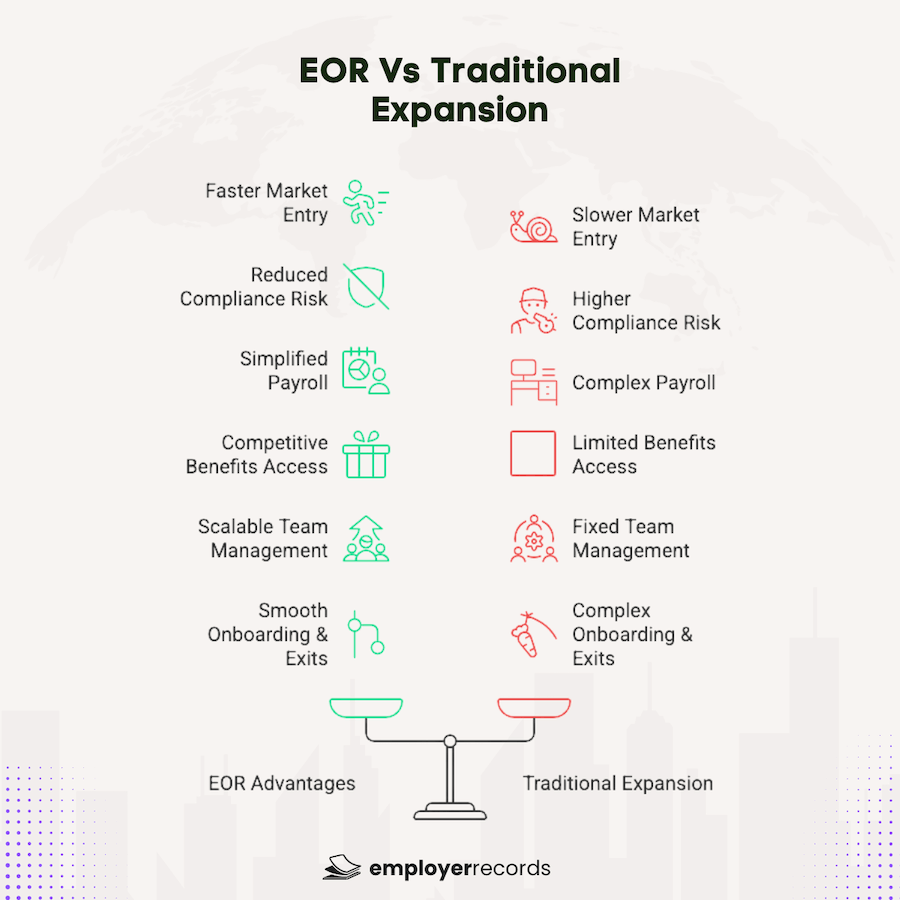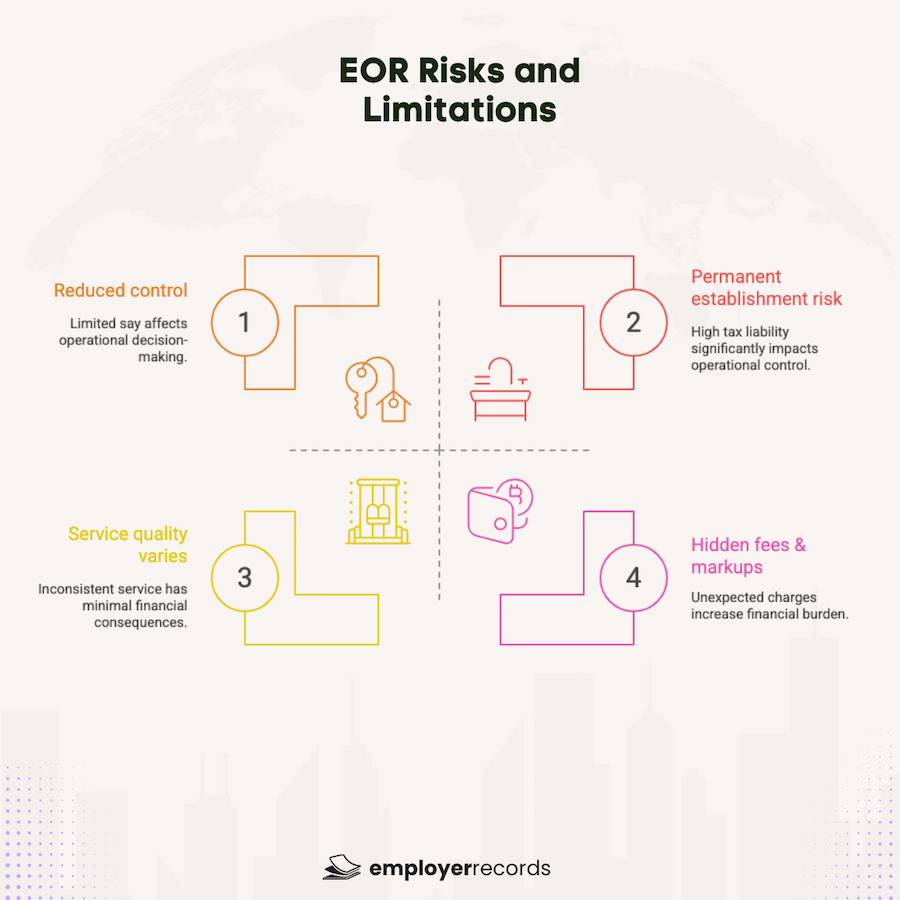Global hiring sounds simple until you try it. Every country has its own rules around contracts, payroll, and compliance, and getting them wrong can be costly.
That’s why many companies rely on an Employer of Record (EOR) to act as the official employer on paper while they focus on the actual work.
An EOR acts as the official employer on paper, handling the heavy lifting, payroll, taxes, benefits, and compliance, while you stay focused on what really matters: the person’s day-to-day work and performance. It’s a model that helps companies hire faster and avoid the delays and costs of setting up entities in multiple countries.
Of course, the convenience comes with trade-offs: service fees, less control over employment terms, and varying levels of support depending on the provider.
In this guide, we’ll break down what every global hiring manager should know about EORs: how they work, when they make sense, the benefits and risks to weigh, and how to pick the right partner as your business scales internationally.
What Is An EOR?
In simple terms, an Employer of Record (EOR) is a partner that acts as the legal employer for your international hires. They take care of the paperwork, payroll, taxes, contracts, and compliance, while you manage the employee’s role and performance.
We’ve covered this in detail in our dedicated guide What Is an EOR and How Does It Work? Check it out if you want a deeper dive. For this article, we’ll focus on what hiring managers specifically need to know when deciding if and when to use an EOR.
Why EORs Are Gaining Popularity?
A few years ago, only fast-scaling startups looked at EORs. Today, even established enterprises are using them, and for good reason. Business priorities have shifted:
- Remote-first hiring is here to stay. Companies want access to the best talent, no matter where that person lives.
- Compliance has become a bigger risk. Governments are tightening enforcement around misclassification, benefits, and tax reporting.
- Speed matters. Setting up an entity can take months and thousands in legal fees. With an EOR, you can onboard in a matter of days.
- HR teams are stretched thin. Offloading payroll and compliance frees them up for strategic work.
In short, EORs give businesses the ability to move fast without creating unnecessary legal or administrative headaches. That combination of speed and risk reduction is what’s driving adoption across industries.
Advantages Of Using An EOR
The biggest reason companies turn to EORs is speed, but that’s not the only benefit. For hiring managers, an EOR can make international expansion far less stressful. Here’s how:
- Faster entry into new markets: Instead of waiting months to set up a subsidiary, you can hire in a matter of days. That flexibility is crucial when business opportunities move quickly.
- Reduced compliance risk: The EOR carries the legal liability for payroll, contracts, and benefits. If labor laws change, they update the process, not you.
- Simplified payroll across borders: Instead of juggling multiple vendors and currencies, you get one point of contact and consistent reporting.
- Access to competitive local benefits: EORs know what’s standard in each country, from health coverage to vacation days, so your offers are attractive to top talent.
- Scalability without the overhead: Whether you need one person in Brazil or a team across ten countries, you can scale up (or down) without entity costs weighing you down.
- Smoother onboarding and exits: Most EORs already have processes in place, which makes hiring and terminations more straightforward and compliant.
In practice, this means your team spends less time buried in paperwork and more time focusing on strategy, culture, and performance.

Risks And Limitations Of EORs
EORs can be a smart way to speed up global hiring, but they aren’t a perfect fit for every situation. Like any outsourcing model, there are trade-offs you’ll want to weigh carefully before moving forward.
1. Higher cost per employee
EORs typically charge either a flat monthly fee or a percentage of salary. For a handful of employees, this cost is easy to justify.
But once you’re building a larger team in one market, those fees can quickly add up and become more expensive than running your own entity.
2. Hidden fees and markups
Beyond the headline fee, some providers tack on extras, like foreign exchange (FX) markups, onboarding costs, or benefit surcharges.
These aren’t always visible upfront, so it’s worth pushing for a detailed, transparent pricing breakdown before signing a contract.
3. Reduced control over employment terms
While you direct the day-to-day work, the EOR is the legal employer. That means your influence over employment contracts, dispute resolution, or policy changes is limited.
For companies that want complete control over the employment relationship, this can be frustrating.
4. Service quality varies
Not all EORs operate at the same standard. Some have strong local teams and responsive support, while others may lack depth in certain regions.
For your employees, this can mean the difference between a smooth HR experience and one full of delays and confusion.
5. Permanent establishment (PE) risk
In some jurisdictions, even when using an EOR, the way you structure operations could trigger a permanent establishment status, and with it, local tax liabilities.
This is a gray area, so it’s important to get legal or tax advice if you plan to hire at scale in a single country.
6. Not always a long-term solution
EORs are excellent for market entry, pilot projects, or small distributed teams. But if you’re planning a long-term presence with dozens of employees in one country, setting up a local entity often makes more financial and strategic sense.

Choosing The Right EOR Provider
Picking an EOR isn’t just about ticking boxes; it’s about finding a partner you can trust to represent your company in another country. In my experience, there are a few areas that matter most when evaluating providers:
1. Coverage and local expertise
Make sure the provider actually has entities and people on the ground in the countries you care about. Some EORs lean heavily on third-party partners, which can create gaps in support and compliance.
Ask directly: “Do you own your entities or rely on partners?” The answer tells you a lot about reliability.
2. Compliance track record
Labor laws change constantly. A good EOR doesn’t just react, they keep you informed and adjust processes before issues arise. Look for a provider with a strong legal and compliance team, not just a slick sales pitch.
3. Technology vs. service balance
Some EORs lead with technology, offering dashboards, integrations, and automation. Others emphasize hands-on service and regional expertise.
Neither is “better,” but you should choose based on what your team values more: efficiency through tech or personal support from local HR experts.
4. Costs and transparency
Pricing models vary widely. Beyond the monthly fee, check for FX markups, setup costs, and benefits surcharges. A transparent provider will give you a clean breakdown upfront; if they dodge those questions, that’s a red flag.
5. Reputation and employee experience
An EOR isn’t just your vendor, they’re your employees’ legal employer. That means your people will interact with them for payroll, contracts, and benefits.
Ask for client references, especially in your industry or region, to understand what the employee experience really looks like.
6. Scalability and fit
Finally, think long term. If you’re just testing a market, almost any EOR can get you started. But if you plan to scale in multiple countries, you’ll need a partner that can grow with you.
Beyond the basics, cultural fit matters too, you want a provider that aligns with how your company operates.
Don’t forget to read this article about how to choose the right EOR for your industry, where we have discussed this topic in detail. You may read this article as well 10 Things To Consider While Choosing An Employer Of Record Solution.
When To Use An EOR?
Before you start looking at EOR solutions, you must understand if your business needs an EOR in the first place. EORs are best suited for moments when you want to move quickly without getting bogged down in entity setup. Here are the most common scenarios where an EOR really adds value:
- Testing a new market: If you’re not sure whether a region will work out, an EOR lets you put a small team in place without making a big legal or financial commitment.
- Converting contractors to employees: Many companies start with freelancers. But when you want to bring them on full-time, an EOR can handle the compliance side so you don’t risk misclassification.
- Distributed or multi-country teams: If you need to hire a few people across several countries at once, an EOR saves you from setting up multiple entities just to support small headcounts.
- Complex compliance environments: In heavily regulated markets, an EOR with strong local expertise helps you avoid mistakes that could trigger fines or tax liabilities.
That said, an EOR isn’t always the long-term answer. If you’re planning to build a large team in one country, need full control over policies, or expect to operate there for years, setting up your own entity usually becomes the smarter move.
EOR vs. PEO: What’s The Difference?
EORs take on the full legal employer role when you hire in locations without a local entity, assuming compliance, payroll, benefits, and liability obligations. In contrast, PEOs enter a co‑employment model: they share HR responsibilities while you retain legal entity ownership and compliance risk.
This distinction helps you decide between legal outsourcing and shared HR management. Also, don’t miss our detailed EOR vs. PEO article.
| Feature | EOR | PEO |
| Legal Employer | Yes (third-party) | Co-employment |
| Local Entity Needed | No | Yes |
| Suitable For | Global hiring without an entity | Domestic HR outsourcing |
| Compliance Liability | With EOR | Shared |
| Speed to Hire | Fast (days) | Moderate (weeks) |
Real-World Use Cases
Here are real-world use cases demonstrating how organizations have effectively leveraged EOR partnerships to accelerate global hiring and comply with international regulations:
Datadog: Scaling Across 15 Countries Without Entities
Datadog, a fast-growing observability platform, needed to hire talent across multiple regions quickly but didn’t want the delays of setting up local entities.
By using an EOR, the company was able to employ people in 15 different countries, all while remaining compliant with local labor laws.
This gave them the ability to focus on product and customer growth while outsourcing the complex admin side of global hiring. The EOR handled payroll, contracts, and compliance, freeing Datadog’s HR team to keep pace with their rapid scale. Read the case study on Papaya Global
3. E-Commerce Firm: Hiring in Asia in Under 48 Hours
A London-based e-commerce company wanted to expand across Asia but lacked the infrastructure to hire legally in each target market. With an EOR partner (Links International), they were able to bring on new employees in multiple Asian countries in less than 48 hours.
The EOR provided locally compliant contracts, payroll processing, and statutory benefits. This speed allowed the company to capture a market opportunity that would have been impossible if they had waited months to establish legal entities.
Read the full case study from Links International
4. Global Advisory Firm: Streamlined Onboarding with Atrium
A leading global public accounting and advisory firm needed a way to manage its growing contingent workforce while maintaining compliance and improving the candidate experience.
They turned to Atrium’s EOR solution to handle payroll and onboarding. By the end of 2020, the firm had expanded its use of EORs beyond contractors to include external consultants as well.
This helped the company standardize processes, reduce administrative strain, and improve retention by delivering a smoother onboarding experience for workers.
Read the Atrium case study
Conclusion: When EORs Make the Most Sense
EORs aren’t a magic bullet, but they can be a powerful tool in the right situations. For companies looking to move quickly into new markets, convert contractors compliantly, or test opportunities without heavy upfront costs, an EOR provides speed and peace of mind.
That said, every model has limits. The per-employee fees and reduced control over contracts mean EORs aren’t always the best long-term play.
If you’re building a large, permanent team in one country, setting up your own entity often becomes more strategic and cost-effective over time.
The bottom line: use EORs to buy speed and flexibility, not as a permanent replacement for global infrastructure. Think of them as a bridge that gets you into new markets faster, with less risk, while you figure out whether deeper investment makes sense.
If you decide to go the EOR route, the real differentiator will be your choice of provider. Look for transparency, local expertise, and a balance between technology and human service.
The right partner won’t just handle payroll and compliance, they’ll protect your reputation, support your people, and give you the confidence to focus on growth.







